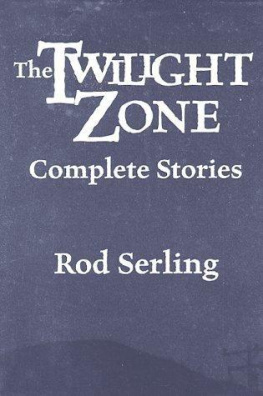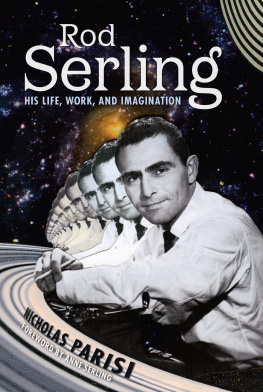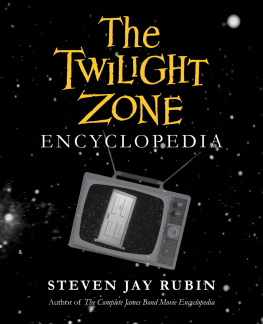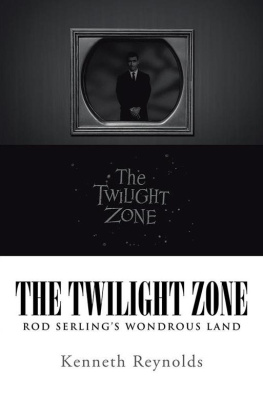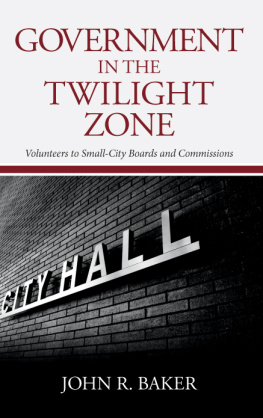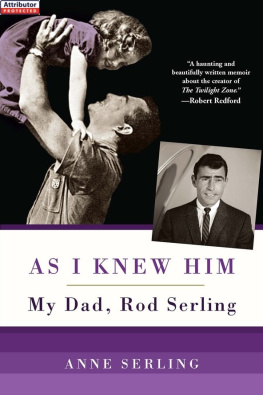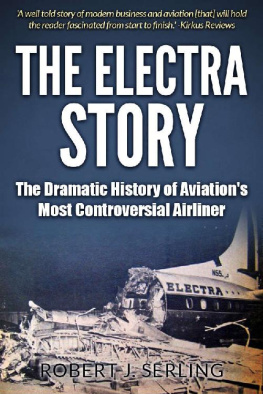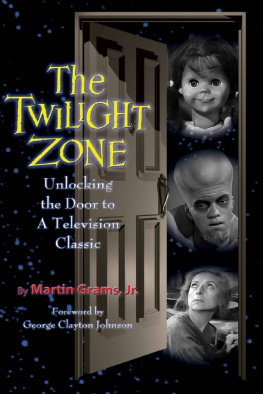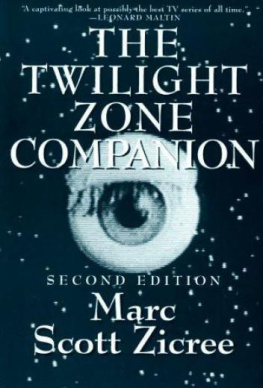Rod Serling - Twilight Zone: Complete Stories
Here you can read online Rod Serling - Twilight Zone: Complete Stories full text of the book (entire story) in english for free. Download pdf and epub, get meaning, cover and reviews about this ebook. year: 1990, publisher: TV Books, genre: Detective and thriller. Description of the work, (preface) as well as reviews are available. Best literature library LitArk.com created for fans of good reading and offers a wide selection of genres:
Romance novel
Science fiction
Adventure
Detective
Science
History
Home and family
Prose
Art
Politics
Computer
Non-fiction
Religion
Business
Children
Humor
Choose a favorite category and find really read worthwhile books. Enjoy immersion in the world of imagination, feel the emotions of the characters or learn something new for yourself, make an fascinating discovery.
- Book:Twilight Zone: Complete Stories
- Author:
- Publisher:TV Books
- Genre:
- Year:1990
- Rating:3 / 5
- Favourites:Add to favourites
- Your mark:
- 60
- 1
- 2
- 3
- 4
- 5
Twilight Zone: Complete Stories: summary, description and annotation
We offer to read an annotation, description, summary or preface (depends on what the author of the book "Twilight Zone: Complete Stories" wrote himself). If you haven't found the necessary information about the book — write in the comments, we will try to find it.
Twilight Zone: Complete Stories — read online for free the complete book (whole text) full work
Below is the text of the book, divided by pages. System saving the place of the last page read, allows you to conveniently read the book "Twilight Zone: Complete Stories" online for free, without having to search again every time where you left off. Put a bookmark, and you can go to the page where you finished reading at any time.
Font size:
Interval:
Bookmark:

Complete Stories
Rod Serling
For my brother Bob,
the first writer of the Serling clan
Contents
Introduction by T.E.D. Klein
If you were born in the twentieth century and, some time during the past thirty years, happened to pass within viewing distance of a television set, youre probably acquainted with the man who wrote this book. Rod Serlingwho died, age fifty, in 1975is surely one of the most familiar figures in the annals of broadcasting, and was the possessor of one of the screens most distinctive voices: a sometimes wry, sometimes somber voice that, even today, is instantly recognizable. You can hear it in every line he wrote.
In fact, if youve seen a single episode of TVs original Twilight Zone , chances are youll never get that voice out of your head, with its echoes of daddy, wise uncle, camp counselor, professor, and network anchorman all rolled into one. Thanks to that voice, and to the series continued popularity in syndicated form, the tales in this book are coming to you with certain uncommon advantagesready-made faces to go with the characters names, the presence of an expert storyteller speaking into memorys earand a certain disadvantage: you may be less likely to approach them as stories that can stand on their own.
And that would be a shame. Because even if the series had never graced the airwaves and Rod Serling had never stepped onto Americas television screens, hands folded gravely before him, the phrase The Twilight Zone, as this book demonstrates, would still signify something special: a world of what if? where wishes come true (sometimes horribly), where illusion reigns and magic really works (but only so long as you believe), where little guys are blessed with the strength of titans, where miraculous machines spell our salvationor our doomand where the most frightening monsters of all turn out to be ourselves.
Its also a world whose coordinates are ever-so-slightly askew: where, on the railroad line between Stamford and Westport, youll find a town called Willoughby that isnt on the map; where a transatlantic jumbo jet is liable to arrive at the right destination but in the wrong year; and where, according to The Mighty Casey, the Brooklyn Dodgers played not at Ebbets Field but at Tebbets. Baseball aficionados may quibble; but then, the Twilight Zone has always enjoyed its own unique geography. TV aficionados may do likewise, noting that, in the televised version of Casey, the team was not the Dodgers but a ragtag bunch known as the Hoboken Zephyrs. There are many such changes in each of the stories that follow, from initial script to TV show to printed page, right down to the way you distinctly remember seeing the show when you were twelve. But these and a thousand other tiny alterations and elaborations are merely the stuff of late-night arguments among trivia buffs. While youre sure to discover lines of familiar dialogue in the pages ahead, and even patches of the original narration, they are simply the skeletons on which Serling hung the tales.
What matters is that, lovingly expanded and embellished, the stories have been given a new life here. For every character who wears a perfunctory description pulled straight from the teleplay, like the attractive widow in her thirties in The Big, Tall Wish, we have others who reveal a recognizable humanity, such as the construction foreman in Escape Clause, warily approaching the scene of a gruesome accident: He covered his eyes because of a normal reluctance to view mangled bodies. He also peeked between two fingers, because of the equally normal trait of being fascinated by the horrible.
The short-story format has also allowed Serling the room to indulge a gift for language and imagery:
It was night when Martin Sloan returned to Oak Street and stood in front of his house looking at the incredibly warm lights that shone from within. The crickets were a million tambourines that came out of the darkness. There was a scent of hyacinth in the air. There was a quiet rustle of leaf-laden trees that screened out the moon and made odd shadows on cooling sidewalks. There was a feeling of summer, so well remembered.
Thats from my favorite story of the lot, Walking Distance. I get a lump in my throat each time I read it, even when proofreading the script version for the first issue of Twilight Zone magazine. (Maybe that was why I missed so many typos.) It also held a special meaning for Serling himself, who was careful to set the short story in upstate New York near Binghamton, his boyhood homejust the sort of personal note that TV leaves out.
And television cant convey the scent of those hyacinths or the cool of those sidewalks.
Or the fact that the doctors feet hurt in Escape Clause.
Or, in another tale, the hint of John Dillinger in a small boys freckled face. (That Serling identifies the outlaw, whose middle name was Herbert, as John J. Dillinger may simply be further proof that things are awry in the Twilight Zone.)
Or another tales conclusion, as dry as if penned by John Collier, in which a minor character, having had his fill of mystery, enjoys a Brown Betty for dessert and goes happily to bed.
Wed miss that Brown Betty on TV.
Wed also miss the occasional asideHis volume of business was roughly that of a valet at a hobos conventionand the rhythm of this simile: Beasley was a little man whose face looked like an X-ray of an ulcer.
And wed miss the description of the bloated, sadistic Oliver Misrell in A Stop at Willoughby, sitting at the conference table and blinking like a shaven owl.
Misrell, whose name suggests a wedding of dismal and miserable, exemplifies Serlings relish for colorful Dickensian namesLuther Dingle, Mouth McGarry, the snobbish Bartlett Finchley, the gunslinger Rance McGrewand, indeed, this book features a gallery of memorably grotesque characters that might almost have stepped from the pages of Dickens: the complete hypochondriac, Walter Bedeker; the thin-lipped, narrow-shouldered, prune-faced Franklin Gibbs, a sour-faced little man in a 1937 suit; Harvey Hennicutt, the silver-tongued con man who can even sell a Sherman tank, and Henry Corwin, the drunken department-store Santa. One larger-than-life character, the swinishly avaricious Peter Sykes, even sports a Dickens villains name.
Its clear, in fact, that Serling was a Dickens fan. His TV play Carol for Another Christmas updates Dickenss A Christmas Carol , and he consciously echoes the latters opening lines in his story The Night of the Meek Theres also a reference to Scrooge in Where Is Everybody? and, though not by name, in The Odyssey of Flight 33, when a distraught airline pilot, face-to-face with the impossible, decides, It was a bad dream that followed a late lobster snack and an extra quart of beer.
Yet Serlings real inspirations were a lot closer to home. If many elements of his fantasies are, inevitably, universal superheroes and saviors, pacts with the devil, wishes with unexpected consequences, magic spells and several Deadly Sins, characters who overreach themselves and meet ironic but appropriate dooms, a modern-day jetliner whose mysterious fate recalls the lost ships in sea legends of old, extra-terrestrials who drift in and out of the tales at will, meddling in human affairs like the gods of Greek myththere is also something uniquely American in these tales. Presided over by a pantheon of home-grown heroesbaseball stars, Hollywood stars, astronauts, gunfighters, and ingenious inventors, as well as such lesser figures as snake-oil salesmen, soda jerks, admen, shady small-time politicians, and a handful of endearing losersthey are set amid classic American locales: suburbia, the wild West, the seductive glitter of Las Vegas, the Mexican border, the ballpark, the prizefight ring (which provided the background for his celebrated Requiem for a Heavyweight and which Serling knew from the inside, having boxed during his army days), and the corporate boardroom (another territory hed explored before, in the TV play Patterns ). While, like fairy tales, his stories are not afraid to teach a moral lesson, many of them focus on such modern American concerns as business ethics, brotherhood, and the ever-present threat of nuclear war.
Next pageFont size:
Interval:
Bookmark:
Similar books «Twilight Zone: Complete Stories»
Look at similar books to Twilight Zone: Complete Stories. We have selected literature similar in name and meaning in the hope of providing readers with more options to find new, interesting, not yet read works.
Discussion, reviews of the book Twilight Zone: Complete Stories and just readers' own opinions. Leave your comments, write what you think about the work, its meaning or the main characters. Specify what exactly you liked and what you didn't like, and why you think so.

